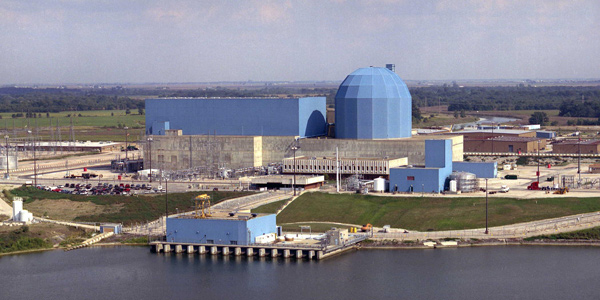By Rory D. Sweeney
FERC and the U.S. Department of Justice struck a blow against opponents of state subsidies for nuclear plants on Tuesday when they jointly filed a brief urging the 7th U.S. Circuit Court of Appeals to reject the argument that Illinois’ zero-emission credit program is pre-empted by the Federal Power Act.
But an analyst for an industry law firm believes the brief, which was quickly cross-filed by Exelon in a similar case in New York before the 2nd Circuit, has a deeper meaning: Leave this to us.
“FERC made clear that ‘we have jurisdiction under the Federal Power Act to deal with what we view as states subsidizing these generation facilities,’” Jennifer Mersing of Stoel Rives told RTO Insider. “I think FERC was saying essentially, ‘We are handling this. … Let us be the forum where this gets worked out.’ They didn’t tip their hand about how they would rule … but I think that FERC is trying to keep within its court how it’s going to deal with states subsidizing certain nuclear facilities.”
The Electric Power Supply Association and retail ratepayers asked the courts to overturn district court rulings last year that dismissed challenges to the states’ ZEC programs. They argued that the state laws were stripping FERC of its authority over the sale of wholesale energy. (See Ill. ZECs Defenders Face Harsh Questioning on Appeal.)
“The Illinois program is not pre-empted,” FERC and the Justice Department said. “It does not require participation in FERC-jurisdictional wholesale auctions as a precondition to receive ZECs. Rather, the Illinois ZEC is ‘targeted’ at an attribute of generation resources over which Illinois has regulatory authority. … The object of the subsidy is the ‘participant,’ not the ‘actual wholesale transaction.’ The district court thus properly concluded that the ZEC program ‘falls within Illinois’ reserved authority over generation facilities.’”
Exelon, which owns five nuclear facilities that stand to benefit from the laws, joined the states in their defense and lauded the brief’s filing.
“The U.S. Department of Justice and Federal Energy Regulatory Commission told the courts that states are free to favor clean nuclear energy over pollution-emitting energy from coal, oil and natural gas power plants,” the company said in a statement. “We remain confident that the courts will uphold the view of policymakers and regulators who support the continued operation of Illinois’ nuclear plants and the environmental benefits they provide for consumers.”
Mersing agreed the brief would likely tip the court’s decision in favor of the states and leave FERC to address the issue. Judges in the Illinois case had previously questioned why EPSA was bringing the issue to them when they were simultaneously pleading their case with FERC, which noted in its brief that it will address complaints pending on the issue.
“It’s hard to quantify … but I think that if you have the agency in charge of regulating wholesale power sales [saying it] doesn’t view this law as being pre-empted by the statute it’s in charge of enforcing, I think that’s going to weigh heavily,” Mersing said. “I think the court was probably waiting for FERC to weigh in, so I would expect a decision would come sooner, but we can’t predict when the court will act.”
She predicted the courts will likely uphold the laws, making it unlikely the Supreme Court would take up the case if EPSA were to continue its appeal. The decisions will likely signal other states to pursue similar nuclear subsidies but keep them funneled through FERC, she said.
“You’ll see more states following the path because it removes some legal challenges, but it also depends on how FERC decides to handle the programs,” she said. “I think you’re going to see more complaints at the FERC level versus the federal court level.”
EPSA has requested permission to respond to the brief by June 9, which Exelon has opposed.




